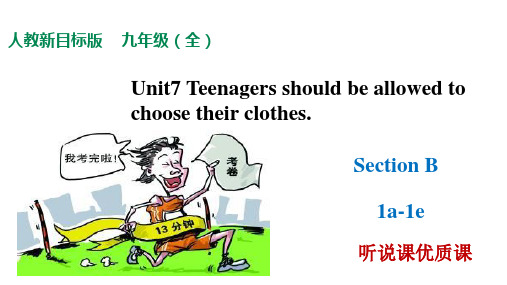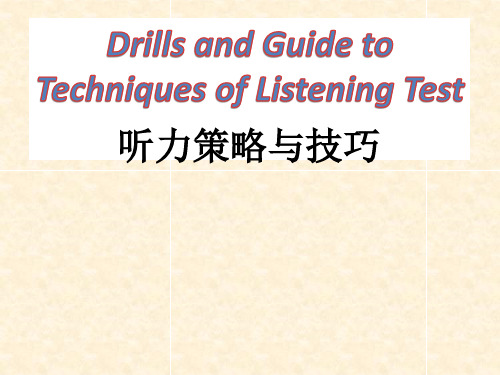九年级英语听力原文PPT课件
外研版初中九年级英语上册 《I can look after 》Home alone PPT课件

simple, easy都可以表示“做某事或理解某事没有太大困难”。其区别是: simple是个最一般的词, 指不复杂或不难懂, 因此能很快被头脑接受; easy也是一个最一般的词, 常指事情容易做, 不费劲。 Theplansounds simple. 这个计划听起来相当简单。 Itisveryeasytodothisthing. 做这件事非常容易。
Translatethesentencesbelow. Payattentiontothewordmiss. 1) He missed the9:30train. 2) Pleasebequiet. Idon'twantto miss a wordofthenewsontheradio. 3) Thetwoboys miss theirfatheralot.
onyourown
miss
beproudof
1. WhydoBetty’sparentsgotoLhasa? 2. Whycan’tBettygotoLhasawiththem?
Becausetheyaregoingtoanimportantmeetingthere.
Becauseshecan’tmisstwoweeksofschool.
Listenagainandcompletethesentences.
WillyoubeOKathome___________? I’ll_________youtoo, andI’llcallyoueveryday. I’llkeepittidysothatyou’ll__________mewhenyougethome.
WhereBettyandherparents? 2. IsBettytravellingwithherparents? 3. Whatthingsdoeshermotheraskhertodoathome?
人教版英语九年级UnitSectionB课件课时,含听力录音

scary dress up haunted house
black cat candy trick or treat
ghost
October
spider
2020/11/22
人 教 版 英 语 九年级 U nit2 S ecti on B 课 件 (共 3课时 ,含听 力录音 )
人 教 版 英 语 九年级 U nit2 S ecti on B 课 件 (共 3课时 ,含听 力录音 )
1b Listen and answer the questions.
2020/11/22
人 教 版 英 语 九年级 U nit2 S ecti on B 课 件 (共 3课时 ,含听 力录音 )
1. Where is Halloween popular?
In north America. 2. When do people celebrate Halloween?
haunted house
鬼屋
spider 蜘蛛
人 教 版 英 语 九年级 U nit2 S ecti on B 课 件 (共 3课时 ,含听 力录音 )
2020/11/22
人 教 版 英 语 九年级 U nit2 S ecti on B 课 件 (共 3课时 ,含听 力录音 )
trick or treat
2. Little kids and even parents _d_r_e_s_s_u_p__ as ghosts or black cats. They can also dress up as fun things like__c_a_r_to_o_n_
characters.
3. Parents take their children around the neighborhood to ask for_c_a_n_d_i_e_s and treats.
九年级全一册Unit7SectionB1a-2e听说课优质课课件

Do you ever …? 你曾经...吗?
get to class late 迟到
study with friends 和朋友学习
fail the exam 考试不及格
pass the exam worry about failing the exam do homework alone
通过考试
often经常 sometimes有时 seldom很少
worry about failing the exam 担心考试不及格
hardly (ever)几乎没有
do homework alone独自做作业
never 从不
主语+频度副词+活动短语+其他
Do you ever...? Yes/No, I ____________ go on a picnic with my__________.
Do you ever__________?
get to class late迟到 study with friends和朋友学习
Yes/No, Ia_l_w_a_y_s_总__是__go on a picnic . fail the exam考试不及格
usually通常
pass the exam通过考试
--No, I don’t agree./I disagree
I think parents should not be too strict with teenagers.
--Do you ever get to class late? --Yes, I sometimes get to class late. 2.学习情态动词的被动 语态结构should be allowed to … 。 3.借助图文,能预测听力内容;通过听录音,能够准确提取所需信息, 借助听到听力信息正确地圈出所听到的句子、连线词组以及补全对话。 4. 通过跟读录音,纠正语音语调;通过小组合作,能就三个话题展开讨 论,发表自己的观点。
九年级全一册Unit6SectionB1a2e听说课优质课课件

Who invented them? 2. 在听力练习中,能够准确判断句子正误,完成句子填 空,能听懂薯片发明的历史以及发明的过程等。 3.在口语交际中能够使用一般过去时的被动语态谈论薯 片的发明过程和历史。
New words
crispy adj. 脆的;酥脆的 [ˈkrɪspi]
人教新目标版 九年级(全)
Unit 6 When was it invented ?
Section B 1a-1e
听说课优质课
1.学习本课新词汇: crispy, salty, sour, by mistake, customer 掌握句型:
—Did you know potato chips were invented by mistake?
3、in the end 最后,终于 (相当于finally 或 at last)
【拓展】 at the end of可以指时间,也可指处所,意为“在……尽头,在……结束时” 。 by the end常和of相连,用于指时间,意为“到……底(末)为止”
And the customer loved them and asked for more. He told the other customers about them, and soon everyone was ordering thinly cut, crispy, salty potato chips.
lazi chicken 辣子鸡 hot pot火锅
They are hot (辣的).
Different food has different taste(味道).
salted
eggs
英语听力精讲PPT课件

5、saying thank you
A、I’d better be going./ I really must be going now./ I think it’s about time I gotta going./ I really should be on my way.
B、So soon? why don’t you stay a little longer?/ but you just got here. Can’t you stay a little longer?/ What? Already? Won’t you have more coffee?/ not yet. At least have one for the road.
• department store, hardware store, restaurant, cafeteria,
• snack, dessert, appetizer, speciality, menu, waiter/waitress, knives/forks
• reception desk, lobby/lounge, suite, double room, attendant, check in/out
•
6、商店与饭店
• daily necessities, pay by installments, be worthy the money, try it for size, go well with, be in season, out of style, household ware, cashier
D、I really don’t know how to thank you./ It’s most kind of you.
2023年人教版英语中考复习听力专题课件

A. five
B. fifteen
C. six
简要笔记: I began … when I...
( )10.The speaker thinks his hobby is____ .
A. simple
B. fun
C. good
简要笔记:reading is a good…
5.区分选项异同
( )6.The speaker reads ____, magazines and newspapers every day. A. cartoon books B. story books C. English books 读选项,区别异同: cartoon /story /English books
him?
Because they ____.
A. very lazy
B. very busy
C. very tired
关键词: and they seldom read for me.
4.做简要的笔记
( ) 7. The speaker began reading when he was
_____years old.
A. Books on history.
B. Books on sports.
C. Books on detectives.
( )11. Which of the following does the girl like doing? A. Watching TV. B. Doing sports. C. Reading books.
1.区分干扰信息 2.分清人物对象 3.抓住关键词 4.做简要的笔记 5.区分选项异同
Sample one: short conversations
九年级英语听力材料

九年级英语听力材料As a ninth-grade English teacher, creating effective listening materials for my students is essential to their language learning. In this document, I will provide a variety of listening materials suitable for ninth-grade English students, including audio clips, transcripts, and comprehension questions.Listening Material 1: Daily Conversations。
Audio Clip: A short dialogue between two people discussing their plans for the weekend.Transcript:A: What are you doing this weekend?B: I'm going to visit my grandparents. How about you?A: I'm going to the movies with some friends. What movie do you want to see?B: I'm not sure yet. Do you have any recommendations?A: I heard that the new action movie is really good. We can check the showtimes online.Comprehension Questions:1. Where is person A going this weekend?2. What are person A and B planning to do?3. What kind of movie does person A recommend?Listening Material 2: News Report。
九年级英语Unit12课文听力材料

九年级英语Unit12课文听力材料中考频道在考试后及时公布各科中考试题答案和中考作文及试卷专家点评,请广大考生家长关注。
时光飞逝,暑假过去了,新学期开始了,不管情愿与否,无论准备与否,我们已走进初三,走近我们的梦!祝愿决战2014中考的新初三学员能加倍努力,在2014年中考中也能取得优异的成绩。
Unit 12: You're supposed to shake hands.Section A, 1bBoy: What are people supposed to do when they meet in your country; Celia?Celia: Well, do you mean when people meet for the first time?Boy: Yeah.Celia: Well, in Brazil, friends kiss.Boy: What about in Mexico, Rodrigo?Rodrigo: In Mexico we shake hands.Boy: How about in Japan, Yoshi?Yoshi We bow.Girl: And in Korea we also bow.Boy: Well, I guess in most Western countries we shake hands.2a,2bDan: Hi, Maria. How was Paul's party?Maria: Oh, Dan, it was a disaster.Dan: It was?Maria: Uh-huh.Dan: What happened?Maria: Well, I was supposed to arrive at 7:00, but I arrived at 8:00.Dan: Oh, so you were late.Maria: Yeah, but in my country, it's different. When you're invited for 7:00, you're supposed tocome later!Dan: I see.Maria: Then when I met Paul's mom, I kissed her. Dan: And you were supposed to shake handsinstead. Maria: That's right. AND I wore a fancy dress.Dan: What's wrong with that?Maria: Well, it was a barbecue, Dan. Everyone else was wearing a T-shirt and jeans.Dan: I guess you should have asked what you were supposed to wear.Section B, 2a, 2bSatoshi: You must be really excited about leaving for Japan tomorrow, Steve!Steve: Yeah, I am. But I'm a little nervous, too.Satoshi: Nervous about what?Steve: Well, for one thing, I don't know how to use chopsticks very well. . . and I don't knowhow to behave at the dinner table.Satoshi: Oh, I see. I could give you a little lesson on Japanese table manners if you'd like. Steve: Really? That would be great!Satoshi: Hmmmm. Let me see. One difference is that sometimes it's polite to make noise whenyou're eating, especially when you're eating noodles. It shows that you like the food.Steve: Really? That's interesting. In the United States you're not supposed to do that.Satoshi: Yeah, I know. OK, so here are some chopstick rules: it's rude to stick your chopsticks intoyour food. And you shouldn't point at anyone with your chopsticks.Steve: Oh, OK. I won't.Satoshi: And also, this isn't about table manners exactly, but you should know that it's rude to eator drink while walking down the street.Steve: Huh.Satoshi: Oh, and the most important thing you need to know is that you're not supposed to talkwhen you're eating dinner. Only parents are allowed to talk at the dinner table. Children are not allowed to speak.Steve: Wow! That's ... that's unusual!Satoshi: I'm just kidding! Steve!。
